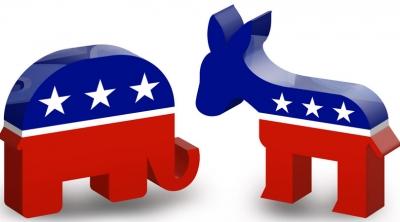Politics—a divisive topic that has the potential to reduce productivity and morale, and strain relationships in the workplace. Employers should be vigilant in their efforts to curb or control the discussion of politics.
While it is natural for employees to discuss current events, lively political conversations can quickly become emotional and prompt angry, loud exchanges especially when a particular viewpoint is disparaged. Contrary to what some employees believe, the Constitutional right to free speech does not apply in most workplaces. Private-sector employers are free to set rules around political discussions and politically motivated activities.
|
Private-sector employees do not have First Amendment rights in the workplace. |
Federal employment laws (Title VII, ADEA, ADA, GINA) do not prohibit discrimination based on political affiliation. However, some states and municipalities have their own laws on this topic. For example, Wisconsin’s Fair Employment Act prohibits discrimination against an employee who declines or refuses to participate in religious or political meetings or communications. In California, New York, and the District of Columbia, employees are explicitly protected from discrimination based on their political affiliation and activities.
Even though political affiliation is not a federal protected class, a heated discussion on topics such as immigration, health care, rights of convicted felons, and equal pay could potentially be perceived as discriminatory or hostile toward a particular group of employees based on race, age, sex, and national origin.
Whether or not an employer has a unionized workforce, the National Labor Relations Act (NLRA) provides private-sector employees the right to engage in “concerted activities for their mutual aid or protection” in order to improve working conditions, which may include political expression. The NLRA protection of open expression, however, extends only to political activity directly related to employment issues. This permits employees to make general statements about politicians’ views on employment-related topics, such as minimum wage or immigration, and how those issues might affect employees or the organization, but does not protect employees’ general statements relating to political campaigns.
Employers can encourage their employees to take an active part in civic affairs, and at the same time require that employees refrain from activities, such as campaigning or passing out political literature, during their work hours, excluding breaks and meal times.
When it comes to dress code, employers may establish a neutral policy that prohibits employees from wearing political badges, pins, buttons, t-shirts, or other types of political clothing.
It is a good idea to provide some guidelines to employees to maintain civility in your workplace. Employers should consider these suggestions:
- Company time and equipment (i.e. computers and company sponsored social media) are not to be used for political purposes.
- Any political campaigning should take place during non-work hours and off-company premises.
- Employees should not coerce coworkers into making political contributions.
- Employees should not push their political agenda onto coworkers. Doing so could constitute bullying or harassment.
- Employees should not discuss political issues with customers or clients.
- Political slogans, banners, or other political objects in the workplace should be removed as they could be viewed as “in-your-face” reminders of personal political views and trigger unnecessary conflict.
- Respect coworkers with differing views. There is a difference between expressing personal opinions and attacking the beliefs of others.
It can be particularly problematic if a manager discusses politics or promotes a particular political agenda. Direct reports or others may feel uncomfortable and pressured to agree with someone who is a leader in the organization. They may fear that if they do not express agreement, retaliatory employment action may be taken against them.
Political discussions or debates in the workplace can be distracting and some may escalate into heated arguments. If they do occur, focus on the disruption and handle it in accordance with your normal disciplinary policy consistent with the nature, frequency, and seriousness of the occurrence. While some political talk is inevitable, employees can be reminded to freely express their political views outside the workplace.
Need help with employee relations issues? MRA’s HR Hotline can help you!



